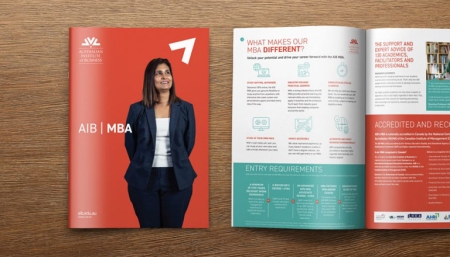From aspirations to achievements: The influential power of an MBA

Authored by Dr Alicia Stanway (Senior Lecturer and Industry Engagement Manager)
Do you have a responsible career backed by valued industry experience, acceptable remuneration, a healthy dose of emotional intelligence, and people implying that they would like to be in your shoes? From the outside, it can look like you are doing well and should be feeling satisfied, yet there’s an innate tapping on the shoulder that you should be achieving more, performing at a higher level, or shifting into another career. If you have enough skill and experience to do your job well, but not enough influence to gain the opportunity you want, then you need to leverage the increased knowledge and expanded business context that an MBA provides. Or, if you have the skills to do what needs to be done today, but not enough credibility to be trusted by senior leadership to play a role in shaping the uncertain future, an MBA may help you bridge that legitimacy gap.
Navigating the Emotional Energy and Uncertainty of Career Growth
Thinking about how to get from your present position in your career, to the level you would like, can consume a lot of emotional energy, whether you realise it or not. Simultaneously, analysing the revolving door of the business environment and the potential implications of new technology on your future can leave you feeling tense about whether you’re primed to stay ahead of the curve. Between these two issues, you can feel underwhelmed about where you are and overwhelmed about what you need to do to get on track. While the notion of living below our capacities can be exhausting, deciding how to confidently lean into where you want to be professionally can be exhilarating, and the time-tested path to future success involves completing an MBA.
Shifting Perceptions and Increasing Value with an MBA
As business circumstances, technological transformation, and digital disruption make the future even more difficult to predict and plan for, you can benefit from the comprehensive knowledge base and broader context of understanding that an MBA provides. As expert in Decision Science Dr. Gary Klein argues in his book, Seeing What Others Don’t, humans are very good at reducing the number of errors in tasks we repeat day to day, but not as good at attaining new insights. What we need to personally succeed, and to add value in professional situations, are insights based on a combination of experience, drive, and new knowledge. Further, as much as an MBA increases a graduate’s business acumen and confidence, it also changes how they are perceived by senior leadership across the broader business community. According to Adam Grocke, Founder and CEO of financial technology company, Sherlok, “while attracting and hiring the right talent with the right knowledge and skill set significantly impacts decision velocity, having team members with an MBA ensures they have the practical tools, knowledge and skills to increase value to an organisation, which shifts in favour towards success for the business.” If you want to be empowered and trusted to do more and achieve more, an MBA may provide the value-add and perception boost you need to impress.
The Power of an MBA: Catalyst for Career Development
Whether you are at the beginning of your career, or are a seasoned professional, the pace of change is not going to slow, and business leaders are going to have to come up with novel solutions to new problems and opportunities on a regular basis. According to the Cornerstone Global Skills Report, business leaders and managers are going to need to be more situationally aware and adaptable, and an MBA provides the foundations for effectively addressing the uncertainty of the future.
The average age of our alumni is 44 years, armed with a wealth of industry experience and newfound opportunities to look forward to. Immaterial of your age and level of career experience, an MBA is a consistent catalyst for career development. According to AIB’s Alumni Insights Report 2021, 93% of our alumni have been able to directly apply the knowledge they learned to their job or business. In addition, ¾ of our alumni changed job function or advanced their career during their MBA. For over 35 years, our MBA has been a catalyst for achieving career goals. Whether it’s to perform at a higher level or move into a new industry, an MBA provides you with the knowledge to undertake broader analysis, plan with deeper insights, present with more confidence, and to increase their decision velocity. Like many AIB graduates (read alumni stories in our latest blog, Dare to invest in your career), leveraging the knowledge and courage that rapidly grows through completing an MBA can be used to make the next move. Cain Cooke, now Chief Executive of electric transport company, LEKI, made the transition from being known as “the franchising guy” to a business executive. Prior to holding an MBA, his experience and achievements were already impressive. However, there was an unsaid question mark around Cain’s level of business and technical prowess: “was I just lucky or a bit of a street fighter?” The MBA was the answer to bolstering his business credibility. This wasn’t just a strategic career shift, but a personal shift that better aligned with Cain’s career purpose and aspirations.
Exploring Career Paths and Embracing Nonlinear Growth
The fact that you found and read this blog to this point suggests that you are well on your way to deciding to embark on an MBA. However, if you are not sure that an MBA is for you, may we suggest that you reflect on your values and career aspirations to work out where you want to go, and how you want to get there. And even if you are confident that an MBA is the next step in your career path, take some time to reflect on how you can combine your experience and drive with the knowledge you will gain from an MBA.
Finding Your Sweet Spot: Aligning Motivations and Capabilities with practical tools
You can make use of available tools in your respective industry, if you’re in HR, check out the HR Career Path Tool to explore where your skills, experience, and aspirations fit in relation to different career paths. Importantly, remember that you sometimes need to move sideways to go forward – career paths are rarely linear. One of my personal favourites to uncover that inner purpose comes from figuring out the sweet spot. In his book, Finding your True North, Harvard Business Professor, Bill George, provides steps to identify what he calls your sweet spot:
- List and be aware of your extrinsic motivations (e.g., recognition, financial reward, and/or job title).
- Then, list your intrinsic motivations that give you a greater sense of fulfilment (e.g., being of service, making an impact, and/or sharing knowledge). Then ask yourself, to what extent are you prioritising these intrinsic motives? How well do they align with your core values?
- Next, list all of the things that you’re really good at (remove the judgement, simply write your strengths down) and then go back through your list honing in on which activities/outputs best reflect your core capabilities. Can you see the connection between your motives and capabilities? This becomes your sweet spot – the space where you are both highly motivated and capable. If the MBA is going to give you the armour to lean into your sweet spot, you know what to do.
While it’s a privilege to be able to teach within AIB’s MBA programme (my sweet spot!), the real hero is watching everyday working professionals transform knowledge and confidence into courage and career success. Studying an MBA provides experienced leaders with a structured path to learn and apply high-value and high-consequence concepts, which can be leveraged via experience and a drive to propel forward toward career goals. Invest in yourself.





